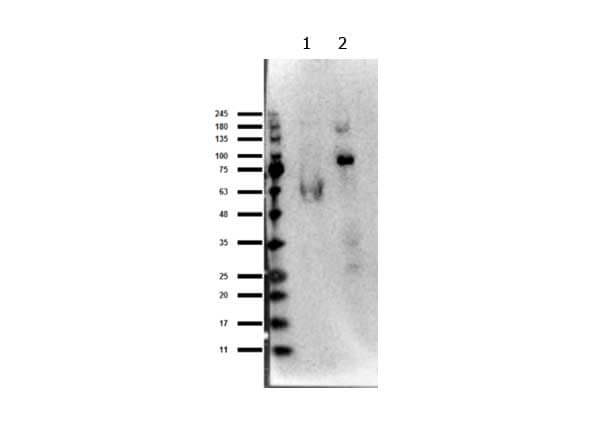Anti-EZH1 (RABBIT) Antibody
EZH1 Antibody
- SPECIFICATION
- CITATIONS
- PROTOCOLS
- BACKGROUND
| Host | Rabbit |
|---|---|
| Conjugate | Unconjugated |
| Target Species | Human |
| Reactivity | Human, Mouse |
| Clonality | Polyclonal |
Application
| WB, E, I, LCI |
| Application Note | Affinity purified Anti-EZH1 antibody has been tested for use in ELISA and western blot. Specific conditions for reactivity should be optimized by the end user. Expect a band ~86 kDa in size corresponding to Ezh1 by western blotting in the appropriate cell lysate or extract. Testing using positive control NIH/3T3 nuclear extract p/n W10-001-A74. |
| Physical State | Liquid (sterile filtered) |
| Buffer | 0.02 M Potassium Phosphate, 0.15 M Sodium Chloride, pH 7.2 |
| Immunogen | Affinity purified Anti-EZH1 antibody was prepared from whole rabbit serum produced by repeated immunizations with a synthetic peptide near the internal portion of human EZH1 protein. |
| Preservative | 0.01% (w/v) Sodium Azide |
| Gene ID | 2145 |
|---|---|
| Other Names | 2145 |
| Purity | Anti-EZH1 is directed against human EZH1 at an internal position. This product is an affinity purified antibody produced by immunoaffinity chromatography using peptide coupled to agarose beads. A BLAST analysis was used to suggest reactivity with this protein in mouse, bovine, and orangutan species based on 100% homology for the immunogen sequence. |
| Storage Condition | Store vial at -20° C prior to opening. Aliquot contents and freeze at -20° C or below for extended storage. Avoid cycles of freezing and thawing. Centrifuge product if not completely clear after standing at room temperature. This product is stable for several weeks at 4° C as an undiluted liquid. Dilute only prior to immediate use. |
| Precautions Note | This product is for research use only and is not intended for therapeutic or diagnostic applications. |
| Name | EZH1 |
|---|---|
| Synonyms | KIAA0388 |
| Function | Polycomb group (PcG) protein. Catalytic subunit of the PRC2/EED-EZH1 complex, which methylates 'Lys-27' of histone H3, leading to transcriptional repression of the affected target gene. Able to mono-, di- and trimethylate 'Lys-27' of histone H3 to form H3K27me1, H3K27me2 and H3K27me3, respectively. Required for embryonic stem cell derivation and self-renewal, suggesting that it is involved in safeguarding embryonic stem cell identity. Compared to EZH2-containing complexes, it is less abundant in embryonic stem cells, has weak methyltransferase activity and plays a less critical role in forming H3K27me3, which is required for embryonic stem cell identity and proper differentiation. |
| Cellular Location | Nucleus. Note=Colocalizes with trimethylated 'Lys-27' of histone H3 |

Thousands of laboratories across the world have published research that depended on the performance of antibodies from Abcepta to advance their research. Check out links to articles that cite our products in major peer-reviewed journals, organized by research category.
info@abcepta.com, and receive a free "I Love Antibodies" mug.
Provided below are standard protocols that you may find useful for product applications.
Background
Anti-Ezh1 Antibody was designed, produced, and validated as part of the Joy Cappel Young Investigator Award (JCYIA). Anti-EZH1 Antibody detects human EZH1. Polycomb group (PcG) proteins are essential epigenetic regulators in normal tissue homeostasis and are involved in transcriptional repression. The PcG members Ezh2 and Ezh1 are important determinants of embryonic stem cell identity, and the transcript levels of these histone methyltransferases are inversely correlated during development. Recent studies have shown that EZH1 also has histone H3K27 methyltransferase activity and binds to an overlapping subset of genes. EZH1 and EZH2 have different expression patterns. EZH2 is found in actively proliferating cells, whereas EZH1 expression is higher in nonproliferative adult tissues. EZH1 partially compensates for the loss of EZH2, as shown in cells lacking only Ezh2. In mice, EZH1 is a regulator of homeotic gene expression implicated in the assembly of repressive protein complexes in chromatin. Anti-EZH1 Antibody is ideal for investigators studying pathogenesis of hematological malignancies.
If you have used an Abcepta product and would like to share how it has performed, please click on the "Submit Review" button and provide the requested information. Our staff will examine and post your review and contact you if needed.
If you have any additional inquiries please email technical services at tech@abcepta.com.













 Foundational characteristics of cancer include proliferation, angiogenesis, migration, evasion of apoptosis, and cellular immortality. Find key markers for these cellular processes and antibodies to detect them.
Foundational characteristics of cancer include proliferation, angiogenesis, migration, evasion of apoptosis, and cellular immortality. Find key markers for these cellular processes and antibodies to detect them. The SUMOplot™ Analysis Program predicts and scores sumoylation sites in your protein. SUMOylation is a post-translational modification involved in various cellular processes, such as nuclear-cytosolic transport, transcriptional regulation, apoptosis, protein stability, response to stress, and progression through the cell cycle.
The SUMOplot™ Analysis Program predicts and scores sumoylation sites in your protein. SUMOylation is a post-translational modification involved in various cellular processes, such as nuclear-cytosolic transport, transcriptional regulation, apoptosis, protein stability, response to stress, and progression through the cell cycle. The Autophagy Receptor Motif Plotter predicts and scores autophagy receptor binding sites in your protein. Identifying proteins connected to this pathway is critical to understanding the role of autophagy in physiological as well as pathological processes such as development, differentiation, neurodegenerative diseases, stress, infection, and cancer.
The Autophagy Receptor Motif Plotter predicts and scores autophagy receptor binding sites in your protein. Identifying proteins connected to this pathway is critical to understanding the role of autophagy in physiological as well as pathological processes such as development, differentiation, neurodegenerative diseases, stress, infection, and cancer.


